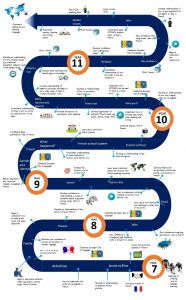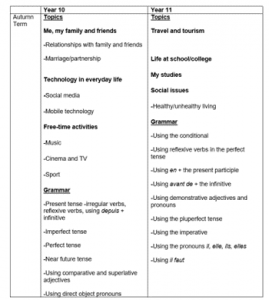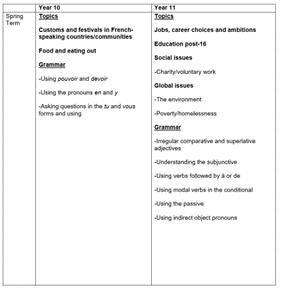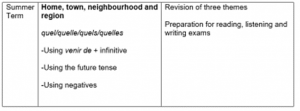Key Stage 4: French
Curriculum Intent
French teaching at Murray Park School aims to prepare students for the globalised world in which we live. Learning French provides an opening into other cultures and a liberation from insularity. We hope to foster the students’ curiosity and deepen their understanding of the world through high-quality teaching. We wish to enable students to be able to express their ideas and thoughts in French and understand and respond to its speakers, both in speech and in writing. It is hoped that our students will leave school with broadened horizons and opportunities that may not have been available to previous generations of their family.
At key stage 4 we aim to build on the key stage 3 national curriculum for languages. Our objective is to enable students of all abilities to develop their French language skills to their full potential, equipping them with the knowledge to communicate in a variety of contexts with confidence. We are passionate about the benefits that learning a language can bring. We strongly believe in languages as a skill for life and something students should enjoy and find rewarding. We want our key stage 4 curriculum to expand our students’ cultural knowledge whilst developing their language skills.
We believe that all students can benefit from learning a language and that all students should have the opportunity to learn a language as part of their broad and balanced education at Murray Park School. We hope that the study of languages can lead students to recognise that diversity is a matter for respect and celebration in a world of multiple cultures and languages.
Curriculum Overview
Students who study French at key stage 4 will follow the AQA course in preparation for their GCSE exams. Below are the aims of the four key language skills.
Listening: understand and respond to spoken language
We aim to ensure that all students can:
- demonstrate general and specific understanding of different types of spoken language;
- follow and understand clear standard speech using familiar language across a range of specified contexts;
- identify the overall message, key points, details and opinions in a variety of short and longer spoken passages, involving some more complex language, recognising the relationship between past, present and future events;
- deduce meaning from a variety of short and longer spoken texts, involving some complex language and more abstract material, including short narratives and authentic material addressing a wide range of contemporary and cultural themes;
- recognise and respond to key information, important themes and ideas in more extended spoken text, including authentic sources, adapted and abridged, as appropriate, by being able to answer questions, extract information, evaluate and draw conclusions.
Speaking: communicate and interact in speech
We aim to ensure that all students can:
- communicate and interact effectively in speech for a variety of purposes across a range of specified contexts;
- take part in a short conversation, asking and answering questions, and exchanging opinions;
- convey information and narrate events coherently and confidently, using and adapting language for new purposes;
- speak spontaneously, responding to unexpected questions, points of view or situations, sustaining communication by using rephrasing or repair strategies, as appropriate;
- initiate and develop conversations and discussion, producing extended sequences of speech;
- make appropriate and accurate use of a variety of vocabulary and grammatical structures, including some more complex forms, with reference to past, present and future events;
- make creative and more complex use of the language, as appropriate, to express and justify their own thoughts and points of view;
- use accurate pronunciation and intonation to be understood by a native speaker.
Reading: understand and respond to written language
We aim to ensure that all students can:
- understand and respond to different types of written language;
- understand general and specific details within texts using high frequency familiar language across a range of contexts;
- identify the overall message, key points, details and opinions in a variety of short and longer written passages, involving some more complex language and recognising the relationship between past, present and future events;
- deduce meaning from a variety of short and longer written texts from a range of specified contexts, including authentic sources involving some complex language and unfamiliar material, as well as short narratives and authentic material addressing relevant contemporary and cultural themes;
- recognise and respond to key information, important themes and ideas in more extended written text and authentic sources, including some extracts from relevant abridged or adapted literary texts;
- demonstrate understanding by being able to scan for particular information, organise and present relevant details, draw inferences in context and recognise implicit meaning where appropriate;
- translate a short passage from French into English.
Writing: communicate in writing
We aim to ensure that all students can:
- communicate effectively in writing for a variety of purposes across a range of specified contexts;
- write short texts, using simple sentences and familiar language accurately to convey meaning and exchange information;
- produce clear and coherent text of extended length to present facts and express ideas and opinions appropriately for different purposes and in different settings;
- make accurate use of a variety of vocabulary and grammatical structures, including some more complex forms, to describe and narrate with reference to past, present and future events;
- manipulate the language, using and adapting a variety of structures and vocabulary with increasing accuracy and fluency for new purposes, including using appropriate style and register;
- make independent, creative and more complex use of the language, as appropriate, to note down key points, express and justify individual thoughts and points of view, in order to interest, inform or convince;
- translate sentences and short texts from English into French to convey key messages accurately and to apply grammatical knowledge of language and structures in context.
Grammar
Students will be expected to develop and to use their knowledge and understanding of grammar progressively throughout their course.
Subject themes
Key stage 4 French covers three distinct themes. Students are expected to understand and provide information and opinions about these themes relating to their own experiences and those of other people, including people in countries/ communities where French is spoken.
Theme 1: Identity and culture
Topic 1: Me, my family and friends • Relationships with family and friends • Marriage/partnership
Topic 2: Technology in everyday life • Social media • Mobile technology
Topic 3: Free-time activities • Music • Cinema and TV • Food and eating out • Sport
Topic 4: Customs and festivals in French-speaking countries/communities
Theme 2: Local, national, international and global areas of interest
Topic 1: Home, town, neighbourhood and region
Topic 2: Social issues • Charity/voluntary work • Healthy/unhealthy living
Topic 3: Global issues • The environment • Poverty/homelessness
Topic 4: Travel and tourism
Theme 3: Current and future study and employment
Topic 1: My studies
Topic 2: Life at school/college
Topic 3: Education post-16
Topic 4: Jobs, career choices and ambitions
Homework in French takes into account that success in the subject is largely based on the retention of vocabulary and grammatical structures. Pupils are set vocabulary lists. As the word lists directly relate to vocabulary covered in class, this takes the form of flip learning. Pupils are required to review their learning on a regular basis and their knowledge of key vocabulary and grammatical structures is assessed on a half-termly basis.
Extra-curricular activities
We aim to convince pupils that language learning should stretch beyond the timetabled lessons. We offer the following opportunities for enrichment in languages:
· C26 revision classes after school
· Booster classes before and after school
· A range of international trips to Europe (including Paris / Disneyland)
· Language taster sessions for European Day of Languages
· Film screenings of foreign language film to complement study in lessons on cinema
· Outside visitors, including students extolling the virtues of language study at university and living abroad





